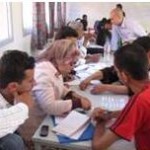Morocco as a Model for Reform
SFCG Board Member, Ahmed Charai, is also the chairman of Med Radio, a national broadcast network in Morocco and publisher of the Moroccan newspaper, L’observateur. He has written extensively on reforms taking place in Morocco, Moroccan democracy, and the differences between protests in Arab countries. Most recently, he has written an article for the Wall Street Journal on what Bahrain and other Arab monarchies could learn from reforms that Morocco’s king has initiated. The article has been receiving positive reviews. Fareed Zakaria says:
Charai details a history of reforms that he feels demonstrate the sincerity of the King’s current proposals:
Observers of this sweeping proposal, which essentially calls for transforming the current political system into a European-style constitutional monarchy, may be inclined to doubt its sincerity. The Middle East and North Africa are full of constitutions that promise freedom and justice but amount to nothing but empty promises. (The murderous dictatorship in Syria boasts one such document.) Factor in the current political climate—tyrant-toppling mass demonstrations across the region—and you might reasonably accuse the king of pandering to a restive population. Morocco has indeed witnessed demonstrations of its own in recent weeks, though most protestors called for systemic reform, not the king’s ouster.
Yet Morocco and the likes of Syria have always been worlds apart—and now the gap is widening even further. This is a kingdom that has been bucking the worst regional trends for more than 70 years.
While the regime of Hassan II (the current King’s father) was more repressive and had little tolerance for dissent, Charai writes that King Mohammed VI “took pains to address the former king’s injustices by establishing the only truth and reconciliation commission in the history of the Muslim world in January 2004. Though it fell short of its South African equivalent, the commission did deliver official acknowledgment of the prior regime’s brutality and compensated its victims.”
Charai then turns to what these reforms might mean for neighboring monarchies.
Now the king is offering to voluntarily democratize his country…. If the king makes good on his pledge, an authoritarian Arab country will have embraced democratizing trends without a shot fired and without a drop of blood shed. The question is whether the King’s Revolution might provide lessons for other monarchs in the neighborhood.
In terms of making substantive reform, there are challenges for each of the countries he lists.
Bahrain’s monarch has the centuries-long claim to legitimacy but lacks the religious legitimacy of the Moroccan monarch, being a Sunni in charge of a country with a Shiite majority. Nor is the Saudi king quite free to loosen his grip: His claims to legitimacy in a highly religious state rest on the support of an extremist clerical elite for whom Western-style democratic reforms are highly suspect. In Jordan and Oman, the monarchies are very young.
Despite these hurdles, the monarchs, he say may have little choice in democratizing.
But in all of these countries, the kings wield enormous power and have the capacity to introduce meaningful reform. In the long run, they may have no choice but to draw lessons from the Moroccan model.
Read the full article at the Wall Street Journal.










